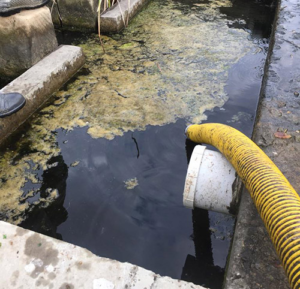Liquid Waste Removal Perth involves a variety of methods to care for domestic and industrial wastewaters. Residential and commercial liquid waste often contains hazardous chemicals and materials, and it must be disposed of properly to prevent environmental damage and potential health risks for humans and animals alike.
Improperly disposed of liquid waste can seep into the groundwater supply and contaminate soil, harming plants and making people ill. It can also cause a host of other issues.

The treatment of liquid waste is a crucial component of effective waste management. It prevents potentially harmful fluids from entering waterways, groundwater aquifers and other sensitive environments. Waste disposal companies specialise in preventing environmental harm by deploying a variety of liquid waste treatment methods. These techniques include separating the fluid from the solid portion of the waste material, solidifying it and dewatering it.
For hazardous substances that require an intricate treatment process, companies often deploy a chemical decontamination technique called superabsorbent polymers. These materials are designed to absorb a wide range of chemicals including solvents, hydrocarbons and acids. The waste is then separated from the polymer and disposed of in accordance with state and federal regulations.
Many businesses produce liquid waste as part of their normal operations and need to dispose of it responsibly. This includes restaurants, commercial buildings, and industrial sites that produce food or other products for sale. Liquid waste can be toxic to humans and animals if not handled properly.
To protect the environment, businesses that produce liquid waste should have containment areas or devices to stop it from flowing out onto the land. If possible, this liquid should be diverted into a wastewater treatment plant or sewer system to prevent contamination of natural water sources.
Liquid wastes produced by businesses may also need to be filtered. This is done to remove solid particles from the waste liquid and allow it to be disposed of more easily. In some cases, this waste is then used as fertiliser to help plants grow.
Non-hazardous liquid waste can also be composted or incinerated. The former is a green disposal method that reduces the volume of waste and turns it into organic matter. The latter is a highly efficient way of disposing of chemicals and acidic substances. The resulting ash and gases can be disposed of in landfill or combusted to generate energy.
Regularly disposing of liquid waste helps businesses maintain high health standards and prevents employees from suffering any illness or injury from handling the material. It also avoids the need to pay expensive treatment costs that are incurred when the waste builds up over time.
Disposal
Many liquid wastes are released into the environment from residential and commercial sources. From sewage to industrial chemicals, these wastes are released into the water supply and soil, impacting plant and animal ecosystems, public health and the economy. The control of these pollutants is critical in order to maintain a healthy environment.
In residential areas, household liquid wastes come in the form of blackwater or wastewater from toilets and greywater, which is produced from drains at homes, apartment buildings and condominiums. These wastes can contain a wide range of contaminants, including toxins, metals, organics and bacteria.
These contaminants can negatively affect the quality of drinking water, which is why proper liquid waste removal is crucial. The contaminated water can also seep into groundwater or surface water supplies, where it could make humans and animals very sick.
Commercial sources of liquid waste include department stores, pharmaceutical and drug companies, hospitals and manufacturing plants. These facilities produce large volumes of liquid waste, which must be properly disposed of to prevent contamination of the local water supply and soil.
Liquid waste disposal can be a complex process, as different kinds of liquid waste need to be handled differently. For example, toxic industrial waste needs to be diluted and neutralized before being disposed of. Medical waste, on the other hand, can be hazardous if it is not properly decontaminated.
In addition, some types of liquid waste require special treatment or handling, such as septic tank waste or leachate. The latter is water that has passed through solid waste, such as in a landfill, and can contain harmful chemicals and materials. A professional waste management company will be able to handle these kinds of liquid wastes with extreme care, adhering to strict safety guidelines for the protection of workers and the environment.
A key factor in choosing the best method of liquid waste disposal is the amount and type of waste that you have. For example, if you have high volumes of septic waste, you may need to choose a method that involves digging a hole or using a portable septic system. If you have limited land space, a technique like incineration may be more appropriate.
Recycling
Recycling is a waste management process which involves the collection, processing and purchase of materials to produce new products. Its purpose is to reduce the use of raw materials, which are increasingly becoming scarce and expensive. This also helps to conserve the environment. Recycling has become one of the most important aspects of modern society.
The recycling of liquid waste is an essential part of overall waste management. When liquid waste is not disposed of correctly, it can cause environmental problems such as contamination of waterways, groundwater aquifers and soil. The contaminated water can make people and animals sick, disrupt plant growth, and even change the chemical composition of natural water sources.
Unlike solid waste, the treatment of liquid waste can be more complicated and require special facilities. Depending on the type of liquid waste, there are various ways it can be recycled. Non-hazardous liquid waste, such as organic material and metal scraps can be decomposed to produce fertilizer or converted into another product. Hazardous materials can be incinerated to prevent them from contaminating the environment, but this method of waste disposal often produces toxic contaminants and greenhouse gases which pollute the air.
Liquid waste recycling has many benefits, including the reuse of raw materials and the prevention of environmental damage. It can also save energy and money by reducing the need to extract new raw materials. It also creates jobs in the manufacturing and transportation industries, which is a positive effect on the economy.
In addition, liquid waste recycling can help reduce the amount of material that is sent to landfill sites. Landfills can be harmful to the environment, causing groundwater pollution, habitat loss and biodiversity loss. Moreover, they can leach hazardous materials into the groundwater supply. Recycling, therefore, is an important way to protect the environment and the economy by avoiding landfills and incinerators.
The recycling of liquid wastes is a complex process, and it requires the involvement of multiple parties to ensure success. It is possible to implement a system that uses existing trash cans or cloth laundry hampers to collect recyclable materials, which may increase participation rates and reduce costs.
Education
Educating staff and students is key for the successful implementation of waste reduction, reuse and recycling initiatives. Getting them to understand the reasons behind using bins, separate containers for different types of waste and the importance of keeping those bins clean is important. This helps to ensure that the waste is disposed of properly and avoids contamination and contaminating other types of waste. Fish and chip shops for example produce a lot of fat which can be disposed of in liquid waste bins, however staff need to know that it should not be flushed down the toilet and should be collected and placed in a container. It is also helpful to educate staff about chemical waste management, such as when old unlabeled sample vials or reagent bottles can be mixed together (compatibility based upon reactivity), and when halogenated chemicals must be segregated.
